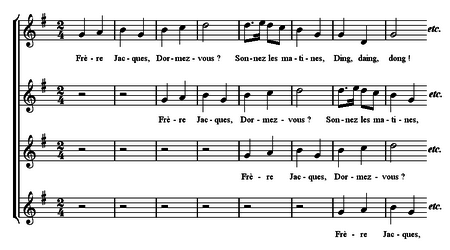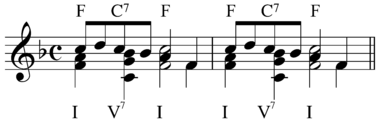Frère Jacques facts for kids
Quick facts for kids "Frère Jacques" |
|
|---|---|

Sheet music
|
|
| Nursery rhyme | |
| Language | French |
| English title | "Brother John" |
| Songwriter(s) | Unknown |
"Frère Jacques" (pronounced "Frare Zhahk") is a very famous nursery rhyme that comes from France. It's also known in English as "Brother John". This song is usually sung in a special way called a round. This means different groups start singing the same tune at different times.
The song is about a friar (a type of monk) who has slept in too long. The song asks him to wake up and ring the bell. This bell is for the matins, which are very early morning prayers. Monks were expected to wake up for these prayers.
Contents
What are the Lyrics?
The song has simple words that are easy to remember. Here are the original French lyrics and their English translations.
Frère Jacques, Frère Jacques,
Dormez-vous? Dormez-vous?
Sonnez les matines! Sonnez les matines!
Ding, dang, dong. Ding, dang, dong.
English translation
Brother Jacques, Brother Jacques,
Are you sleeping? Are you sleeping?
Ring/Sound [the bells for] matins! Ring [the bells for] matins!
Ding, dang, dong. Ding, dang, dong.
Traditional English lyrics
Are you sleeping? Are you sleeping?
Brother John, Brother John,
Morning bells are ringing! Morning bells are ringing!
Ding, dang, dong. Ding, dang, dong.
The song is about a monk's job to ring the bell for matins. It seems Frère Jacques has overslept. Someone is singing to wake him up so he can ring the bells. The English version changes the meaning a little. In English, Brother John is woken up by the bells, not by someone singing to him.
Understanding the Names
The word friar comes from an old French word, frere. This word means "brother" in English. French was used a lot in England during the 1200s. This is when the first groups of friars started. The French word frère comes from the Latin word frater, which also means "brother."
The French name Jacques is not usually translated as "John." The French name for "John" is "Jean." Instead, Jacques is like the English names James or Jacob. All these names come from the Latin Iacobus. They refer to the Biblical Patriarch Jacob and the apostles known as James.
Where Did "Frère Jacques" Come From?
People have different ideas about how "Frère Jacques" started. There are a few interesting theories about its origin.
Early Ideas About the Song
Some people thought "Frère Jacques" might be connected to a doctor named Frère Jacques Beaulieu from the 1600s. However, researchers have not found any proof for this idea.
Other historians believe the song might have been created to make fun of certain groups or people. For example, some think it was used to tease Dominican friars. These friars were sometimes called the Jacobin order in France. Some people thought they were lazy and lived too comfortably.
There's also a claim that "Frère Jacques" came from a Russian seminary song. This Russian song was about a "Father Theofil."
When Was the Song First Published?
Learning about the song's first appearance in print helps us understand its history.
First Time in Print
The earliest known written version of the tune is from a French paper around 1780. This paper is kept at the French National Library in Paris. The song was called "'Frère Blaise'" in this old paper.
A collector named James Fuld said the tune was first printed in 1811. He also said the words and music were published together in Paris in 1869. An earlier book in 1825 had the words. It also described the melody using solfège (do-re-mi), but it didn't have musical notes.
The words and music appeared together in a popular book in 1860. This book was called Recreations de l'enfance. It was written by Charles Lebouc. This book was reprinted many times.
A French music expert, Sylvie Bouissou, found some clues that the composer Jean-Philippe Rameau might have written the music. A paper at the French National Library lists "Frère Jacques" among 86 canons, with Rameau as the writer.
In 1926, the tune was used in a patriotic song in China. This song was called "Revolution of the Citizens."
How Does it Compare to Other Songs?
"Frère Jacques" sounds a bit like an old Italian piece from around 1615. This piece was called Fra Jacopino. "Fra Jacopino" can be an Italian translation for "Frère Jacques."
The "Frère Jacques" tune is one of the simplest repeating canons. It is similar to the melody of "Three Blind Mice." Because it is so simple, it spread easily to many places. For example, the melody is so well-known in China that many people think it's a Chinese folk song. In China, it's often called "Two Tigers."
How "Frère Jacques" Influenced Culture
The song "Frère Jacques" appears often in popular culture. You might hear it in movies, TV shows, or other songs.
See also
 In Spanish: Frère Jacques para niños
In Spanish: Frère Jacques para niños
 | William Lucy |
 | Charles Hayes |
 | Cleveland Robinson |



